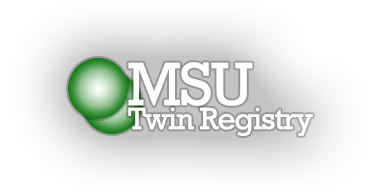What is the MSUTR?
What is the MSUTR?
The Michigan State University Twin Registry (MSUTR) is a large, population-based twin registry, housed in the Department of Psychology at Michigan State University. The registry is made up of thousands of twins and their families from throughout the state of Michigan and surrounding states who have shown an interest in our research and typically have participated in one or more of our twin studies. The invaluable contributions from the twins and their families have helped lead to discoveries that have the potential to inform treatment and prevention efforts for a range of conditions that carry significant consequences for individual and public health.
To learn more about how twin research is “science’s superpower”, check out this MSU Today article!
To learn more about the MSUTR, including our studies, our staff, and how to get involved, please explore our website. Be sure not to miss the Resources section with helpful information for twins and their families, including information on college scholarships, twin organizations, zygosity testing, and more. Please don’t hesitate to contact us if you have any questions!
PURPOSE
The primary aim of the MSUTR is to examine developmental differences in genetic, environmental, and neurobiological influences on internalizing (e.g., depression) and externalizing (e.g., acting out behaviors) symptoms. Due to its large size (more than 30,000 twins have enrolled to date), diversity, and the comprehensiveness of the data collected, the MSUTR is uniquely positioned to become a leading resource for health research in a variety of areas.
Twin participants span several developmental stages (i.e., childhood, adolescence, and adulthood). The registry assesses twins during all of these developmental stages to ensure that genetic, environmental, and biological risk factors specific to particular developmental periods are identified and examined for their relevance to mental and physical disorders.
In sum, the MSUTR research will allow for better understanding of the environmental, genetic and neurobiological factors that influence illness and behavior. Our research will aid in the identification of the origins of internalizing and externalizing symptoms, ultimately informing treatment and prevention efforts.
HISTORY
The MSUTR began as a university-based twin registry in 2001, assessing undergraduate men and women at MSU. While undergraduates continue to participate in our studies, we have since expanded recruitment efforts to include twins throughout Michigan, aged 3-55 years. This expansion began in 2004, in collaboration with the Michigan Department of Health and Human Services (MDHHS), and continues to the present. The MDHHS identifies twins using birth records and conducts anonymous recruitment mailings on our behalf. Since 2008, the majority of recruitment into the registry has occurred through the Michigan Twins Project (MTP), a brief mail-in survey with questions about basic demographic characteristics, family health history, and the twins’ personalities and behavior. Participation in the MTP serves as an introduction to the registry and is now the most common way for twins to get involved with the MSUTR.

